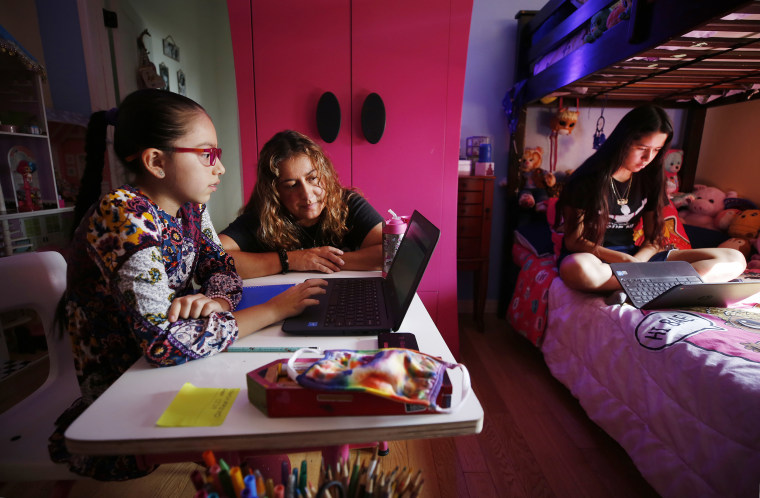Three weeks after her school in the Compton Unified School District in Los Angeles County closed for in-person instruction because of Covid-19 last year, I learned that my niece, Melidey, had not once logged on to her online lessons for her fourth grade classes. It turned out that her well-intentioned day care provider didn't know that Melidey had a new virtual component of her school day that required supervision, and Melidey's mother didn't own a device for her to take to day care anyway — let alone have a Wi-Fi connection at home.
Sadly, most of us now know that Melidey's situation wasn't unique: Millions of children were and still are having the same experience.
By May, the realization that these problems might exacerbate inequities, including literacy gaps, for entire grades of students was setting in for teachers, parents and administrators. And Melidey, once enthusiastic, was among the millions of children who had begun to languish, despite the best efforts of her teacher and the school principal.
My worst fears about Melidey's performance were confirmed in November, when her teacher and parents agreed to let me sit in on her parent-teacher conference. Her parents and I were shocked to learn that she had over 20 assignments outstanding and had missed several opportunities to take quizzes and tests, which could have provided valuable insight into her academic progress (or lack thereof) earlier than the fall.
By June, students could lose an average of five to nine months of learning.
I'm an education leader, and it isn't often that you see the trends about which you're concerned pop up in your own family.
When most schools switched from in-person to remote learning in the spring, the phrase "Covid slide" began cropping up everywhere among those in education. When children who are learning to read lose progress, it gives all of us reason for concern, because studies show that children who fail to reach reading proficiency by the third grade are four times more likely to drop out of school early and repeat the cycle of generational poverty. And even before this pandemic, more than 80 percent of children from economically disadvantaged families were missing this milestone.
And yet, a single report in November, belying all my own experience, suggested that Covid-19 learning loss might not be "as devastating as previously thought." The Wall Street Journal, citing another report from a standardized testing company, reached a similar conclusion. I started to wonder whether Melidey was an anomaly or whether the educators I was talking to had, in fact, overestimated how much students' academic progress would be affected by pandemic-related school closures.
As it turned out, there were troubling deficiencies in the data. Buried within the first report was the often overlooked caveat that about 25 percent of students who were tested in 2019 didn't participate in testing in fall 2020. And the students who weren't in the 2020 dataset were disproportionately Latinos and African Americans, who we know are at the greatest risk of being left further behind because of the pandemic.
Ignoring such a large swath of the student population isn't just inaccurate — it's irresponsible.
More inclusive research from the fall has revealed acute learning losses, particularly among students of color. A report by McKinsey & Co., which used data from more than 200,000 K-8 students who took the i-Ready diagnostic assessment, suggests that students had learned just 87 percent of the reading that their grade-level peers typically learn in a nonpandemic year. The data suggest that students lost an average of 1.5 months of learning in reading during spring school closures. Losses were especially acute in schools that serve mostly students of color, where learning was just 77 percent of the historical average. That means that by June, students could lose an average of five to nine months of learning. For students of color, Covid-19 could result in an entire year of learning losses.
Of course, there are multiple dimensions of learning loss. There have been severe social-emotional impacts to children from the disruptions to their environments, the lack of social interaction with their peers, the stress of adapting to remote learning, the challenges with access to adequate technology and more.
The evidence is clear that learning loss as measured by academic achievement alone is catastrophic and cause for great concern.
We must support families by equipping them, physically and otherwise, to help their children succeed.
Having accurate data about the equity disaster that is unfolding matters in a moment when state and district leaders are responsible for spending $4 billion in new funding to avert an equity disaster — and ensure that learning continues. It matters in a moment when a misplaced belief that the kids are alright may make the difference between allowing the existing gaps to widen or using new resources to double down on efforts that close them.
The good news is that we have promising evidence of what works. Districts are already planning for what we should call "the summer of joyful learning," including enrichment academies that can give our children an opportunity to heal and learn at the same time. They are beginning to invest in high-dosage tutoring programs, which have been shown to provide the personalized learning instruction that boosts student outcomes for early readers in particular.
And we must support families — who are ultimately the greatest and most undervalued resource — by equipping them, physically and otherwise, to help their children succeed.
The data are clear that, especially for low-income, Black and brown students, pandemic-related learning loss has been catastrophic, and we must act with urgency. Doing anything less would undermine the efforts of educators, parents and community leaders who are trying to build a more hopeful future for all children. Otherwise, we will rob students like Melidey of the bright futures they once had, long before anyone ever uttered the phrase "Covid slide."




